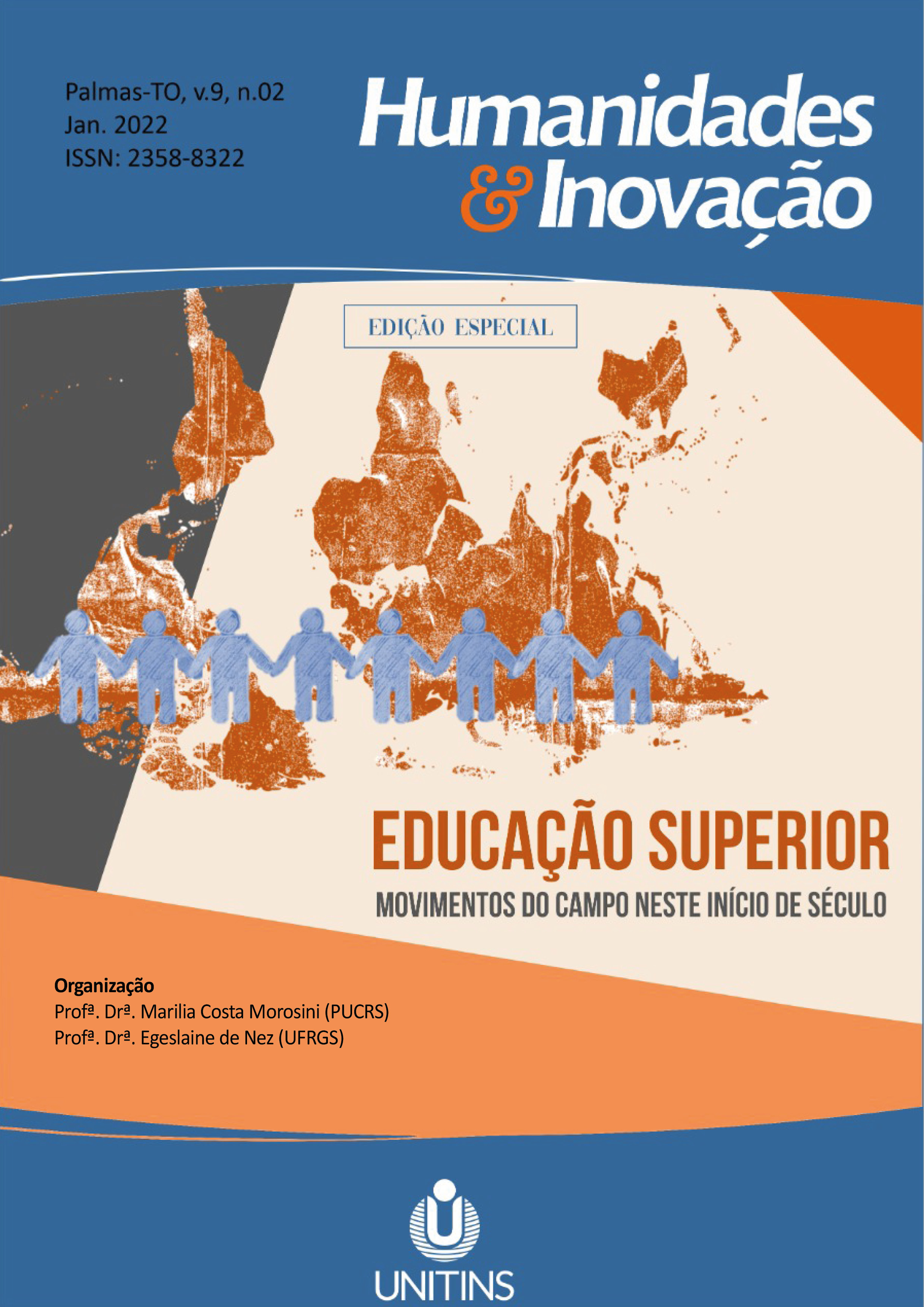INTERNATIONALIZATION AT HOME: POLICIES, PRACTICES AND PERSPECTIVES FROM THE GLOBAL NORTH AND SOUTH
Resumen
The internationalization of higher education has become a criterion of quality in the evaluation of higher education institutions, and it has been linked to mobility, focusing on the exchange of students and academics, as well as on bilateral agreements seeking to promote joint-doctoral programmes and research networks. In 2018, a Brazilian university, the Pontifical Catholic University of Rio Grande do Sul (PUCRS) was the recipient of resources to implement actions focusing on improving its internationalisation levels from a specific funding line called CAPES-PrInt, which was implemented by the Coordination for the Improvement of Higher Education, Brazilian Ministry of Education and Culture. It is within this context that a comparative research collaboration has develop between PUCRS, Brazil and Newcastle University, United Kingdom. In this article we report on a process and methodology to review and revise current policies, practices and perspectives at PUCRS for Internationalisation at Home, developed during a research partnership with Newcastle University.
Citas
ATIAH. Suggested applications of ATIAH’s Resources: Self-Audit, Curriculum Framework and Evidence Framework. 2018. Available at:
BAETA, A. PrInt: instituições selecionadas iniciam execução de projetos de internacionalização. Available at:
DE WIT, H, & JONES, E. Inclusive internationalization: Improving access and equity. International Higher Education [Online] 94. 2018. Available at:
KNIGHT, J. Concepts, rationales, and interpretive frameworks in the internationalization of higher education. In: Deardorff, DK, De Wit, H, Heyl, JD. (eds) The Sage Handbook of International Higher Education. Thousand Oaks, CA: Sage, 27–42. 2012.
MOROSINI, M., CORTE, M. D., & GUILHERME, A. Internationalization of Higher Education: A Perspective From the Great South. Creative Education 08: 95–113.
MOROSINI, M. (2018). Internacionalização do currículo: produção em organismos multilaterais. Roteiro, 43(1), 115-132. 2017. Available at:
MOROSINI, M., & KAMPFF, A. Internationalization Brazilian Higher Education and the partnership with NU: the consolidation of IaH concept. International Virtual Exchange Conference Symposium: Internationalisation of Higher Education: perspectives from the Global South and the Global North. Sue Robson; Tony Young & Alina Schartner; Marilia Morosini & Adriana Kampff; Müge Satar, Sara Ganassin, Song Li. Book of abstracts: Şaziye Taşdemir, Peter Sercombe, Müge Satar. 16.09.2020. 14:45 – 15:45. P. 136. 2020.
MOROSINI, M., VIERA, P., & WOICOLESCO, V. Construyendo oportunidades de aprendizaje internacional e intercultural en línea en tiempos de pandemia: Brasil & Uruguay. In: Congreso de la Red latinoamericana – COIL. First latin American Network conference: COIL: in and with latin America at a time of change. La Red LatAm COIL y la Universidad Estatal de Sao Paulo - UNESP. 14 – 18 Jun. 2021.
PUCRS. PUCRS-CAPES-PrInt. Available at:
QUIVY, R., & CAMPENHOUDT, L. Manual de Investigação em Ciências Sociais. Trad. Lisboa: Gradiva, 1992.
ROBSON, S. Internationalization at home: internationalizing the university experience of staff and students. Educação, 40 (3), 368-374. 2017.
ROBSON, S., & WIHLBORG, M. Internationalisation of higher education: Impacts, challenges and future possibilities. European Educational Research Journal, 18(2), 127– 134. 2019. Available at:
ROBSON, S. Evolving Conceptions of Internationalisation at Home. International Virtual Exchange Conference Symposium: Internationalisation of Higher Education: perspectives from the Global South and the Global North. Sue Robson; Tony Young & Alina Schartner; Marilia Morosini & Adriana Kampff; Müge Satar, Sara Ganassin, Song Li. Book of abstracts: Şaziye Taşdemir, Peter Sercombe, Müge Satar. 16.09.2020. 14:45 – 15:45. P. 136. 2020.
A submissão de originais para este periódico implica na transferência, pelos autores, dos direitos de publicação impressa e digital. Os direitos autorais para os artigos publicados são do autor, com direitos do periódico sobre a primeira publicação. Os autores somente poderão utilizar os mesmos resultados em outras publicações indicando claramente este periódico como o meio da publicação original. Em virtude de sermos um periódico de acesso aberto, permite-se o uso gratuito dos artigos em aplicações educacionais, científicas, não comerciais, desde que citada a fonte (por favor, veja a Licença Creative Commons no rodapé desta página).











